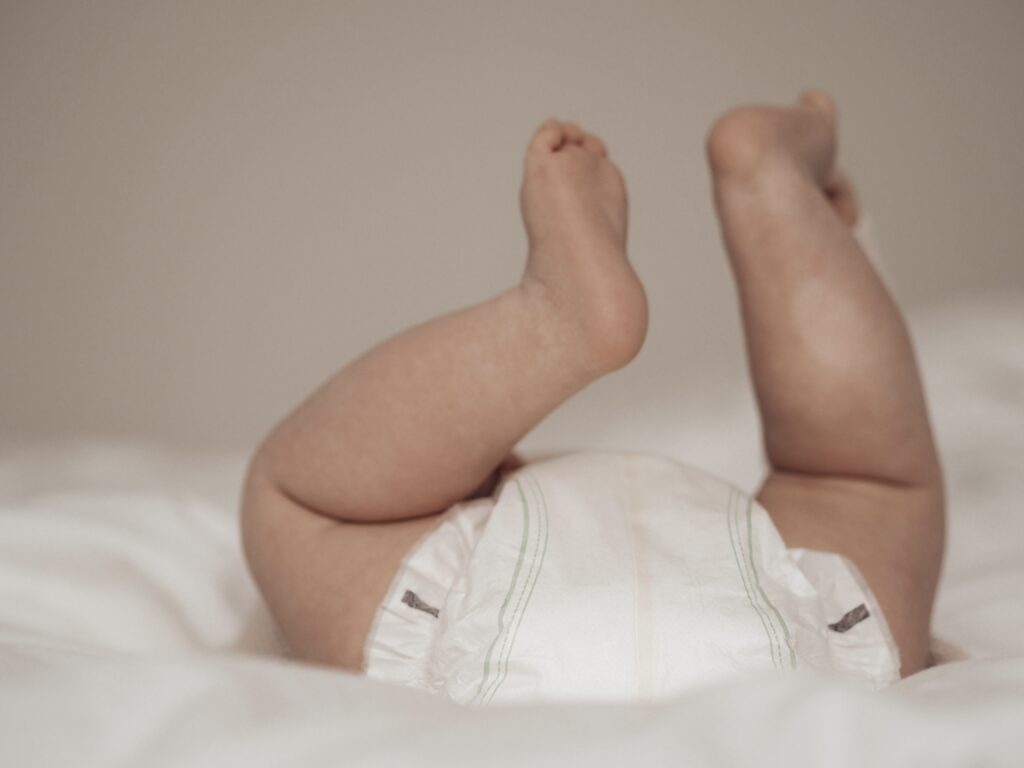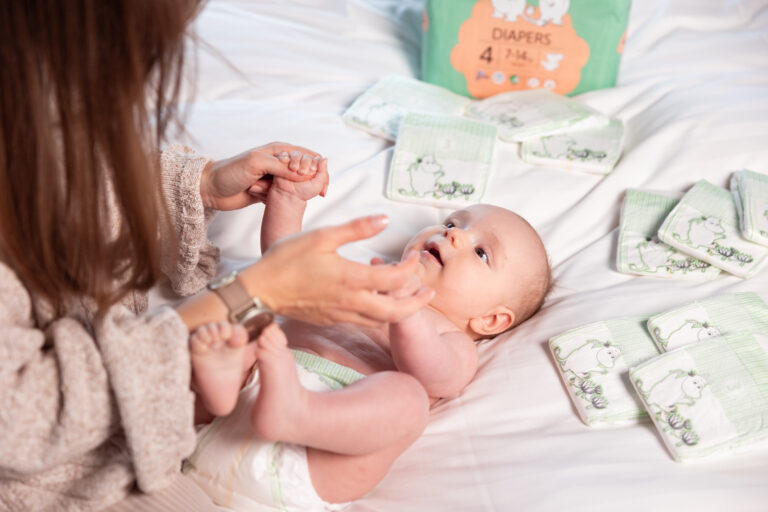If your baby doesn’t poop, or poops infrequently, this can be a cause for concern. In this article, we look at the reasons that can lead to your baby not pooping, and when this should be a concern.
The baby is not pooping: What could be the cause?
A baby’s bowel function is often a subject of interest for parents. New parents should understand that babies’ intestines continue to develop after birth and this can lead to a number of digestive problems such as constipation. Daily or regular bowel movements are important for babies because they help them to get rid of waste and toxins that can accumulate in the gut.
If your baby does not poop every day or if it seems to be painful for them to do so, it could be for a number of reasons. For example, constipation can be caused by nutrition, dehydration, lack of exercise or problems with the nervous system. However, it is usually a temporary phase that will clear up on its own as the baby grows and develops. However, you need to keep an eye on your baby’s behaviour and the amount of poo, as prolonged episodes of constipation should not be ignored. If your baby does not poop for several days and this is accompanied by other symptoms such as loss of appetite or crying, you should consult your doctor.
How often does your baby poop: What is normal?
The number of times your baby poops can vary widely. This is due to a number of factors, including the age of the baby, the composition of the diet and individual metabolism. The normal number of stools in a newborn baby can be as high as after each feeding, i.e. up to 6-8 times a day. The food fed also corresponds to the amount of stool and a baby fed a good quality breastfeeding diet may even go without pooping for a few days.
This is normal and is because the baby absorbs almost all the food during breastfeeding. As the baby gets older, the frequency of stools may decrease to 1-2 times a day. However, concern should be expressed if the baby is experiencing significant discomfort or if the stool is unusually small amount. Remember that each baby is an individual and the frequency of stools may vary. It is more important than normal to monitor your baby’s behaviour and overall well-being.
Find out more about how often your baby’s diaper should be changed – you can find the instructions here!
A healthy, varied and fibre-rich diet helps maintain a healthy gut for your baby.
The effect of diet on your baby’s intestinal functions
Your baby’s diet has a big impact on how well their bowels work and how often they poop. It is therefore important that your baby’s diet is varied, correctly formulated and contains the necessary nutrients. Breastfeeding is generally the best option in the first few months of a baby’s life, as breast milk contains all the nutrients necessary for the baby’s growth and development. Breast milk is also easily digestible, which is why breastfed babies usually poop normally.
When your baby starts to eat solids, your bowel function may change. New foods may cause constipation or stomach upset. This is normal and the baby’s gut will adapt to the new nutrients over time. It is important to make sure that your baby does not get too much protein, as this can lead to constipation. A healthy, varied and fibre-rich diet will help maintain a healthy gut for your baby.
Check out the first steps towards solid foods here!
Procedures and treatment: What can you do at home?
It can be worrying if your baby doesn’t poop, but luckily there are many things you can do at home. If your baby is constipated and in pain, you can try a warm bath and gentle tummy massage to try to improve the situation. These will relax your baby’s bowels and may help to encourage defecation. You can also make changes to your baby’s diet.
If your baby is already eating solid food, you can improve the quality of stools by adding fibre-rich foods such as fruit and vegetables to the diet. Ensuring fluid intake is important for babies of all ages, as adequate hydration helps the stool to move through the intestines. Moving or carrying your baby in a carrier can also help the bowels to function properly. In extreme cases, over-the-counter medicines are available that can help your baby to pass stools.
The most important thing is to monitor the baby’s symptoms and general condition. If your baby seems impatient, you should consult a doctor.

When is it time to consult a doctor?
Although occasional bouts of constipation or intermittent lack of poo are common among babies, it is important to be able to recognise when to seek medical advice. If your baby does not poop for several days, or if it seems to be clearly painful for them, you should contact a healthcare professional.
A doctor should also be contacted if there is blood in the baby’s stool, if the baby has a high fever or if they vomit frequently. Other signs that your baby may be experiencing bowel disturbances include uncomfortable behaviour, lack of appetite or crying. If you notice several of these signs at the same time, it is important to seek professional help. Your doctor will be able to check for any illnesses or disorders and offer appropriate treatment and advice if necessary.
Constipation in a baby and the treatment
Constipation is a condition in which your baby is unable to poop regularly or has difficulty pooping. This can be caused by a number of things, such as dietary changes, dehydration or, less commonly, a hereditary or medical condition. If the constipation lasts for a few days or if the baby is clearly in discomfort or pain, it is advisable to consult a doctor.
However, constipation can often be treated at home with a few basic remedies. One effective way is to increase the amount of fibre in your baby’s diet when they are already eating solid food. In addition, measures to make it easier for the baby to move around can help with bowel function. If these methods do not help and constipation persists, it is important to contact a health professional. They can offer other solutions based on your baby’s individual needs and symptoms.
Find out more about what different colours and textures of baby poo can mean – click here for more information!
Understand your baby’s physical signs
Babies communicate with their physical signs long before they can speak. It is important to learn to understand your baby’s specific messages so that you can react correctly to potential health problems such as digestive problems. If your baby is not pooping or is experiencing pain or discomfort when trying to defecate, they may express this through crying, growling, restlessness or loss of appetite. The baby may also be unusually tired or irritable.
If your baby is healthy, active and eating normally, but doesn’t poop for several days, there is usually nothing to worry about. However, if your baby is not pooping and you notice other symptoms such as a hard tummy, fever or loss of appetite, it is a good idea to seek medical advice. By understanding your baby’s physical signs, you can better meet their needs and possibly prevent bigger health problems.
It is important to note that breastfeeding babies can sometimes go several days without pooping.
Breastfeeding and its effect on your baby’s bowel functions
Breastfeeding is important for your baby’s bowel function. Breast milk is the baby’s first food and contains all the nutrients that are important for the baby’s development in the right proportions. Breast milk also contains prebiotics, which support the development of a healthy gut microbiome and promote smooth digestion. This is why breastfed babies rarely suffer from constipation.
However, it is important to note that breastfed babies may sometimes go several days without pooping. This is because breast milk is such a complete source of nutrition that the baby is able to use almost all of it, leaving little to defecate on. However, if you notice that your baby is clearly in pain or uncomfortable, you should consult a health professional.
Fluid treatment: Why is it important?
Fluid treatment plays an important role in the prevention and management of constipation. Babies need plenty of fluids to stay well hydrated. Fluid treatment is particularly important if your baby does not poop regularly or if they are more prone to dehydration because of fever or heat. The importance of fluid treatment is even more important if the baby has been sweating profusely, vomiting or diarrhoea, as in these cases a lot of fluid is lost and fluid intake needs to be replenished quickly.
This is also true if the baby is eating solid food. Fibre, which is recommended to prevent constipation, works best when it gets plenty of fluids. Fibre absorbs fluid and swells, softening the stool and making it easier to pass through the intestines. For breastfed babies, breast milk provides all the fluid they need. For a solid-food baby, fluid management includes both water and other liquid foods such as breast milk or a milk drink suitable for babies.
Baby not pooping: Summary
Growing up, the baby’s bowel function is one important indicator of health and well-being. It is important to remember that each baby is an individual and the frequency and quality of stools may vary. Often a baby who does not poop is not suffering from any illness. This may be due to changes in diet, such as the introduction of solid foods, or because breastfeeding means that all the nutrition is used up and there is little stool.
A good rule is to monitor your baby’s well-being and general health as a whole. If your baby is happy and growing normally, the reason for not pooping is probably simply the baby’s individual metabolism. However, if you notice changes in your baby’s behaviour, such as a lack of appetite or unusual crying, or if your baby doesn’t poop for a long time, you should consult a doctor.
Order a free Diaper Hero diaper sample
Have you already checked out Moomin Baby diapers?
Take advantage now and order your free Diaper Hero Diaper Sample here!
Moomin Baby diapers are manufactured in Finland’s only diaper factory using only environmentally responsible and pure raw materials, making them a safe choice for your baby’s sensitive skin. Order a free sample and experience the high quality and comfort of the diapers for yourself!










